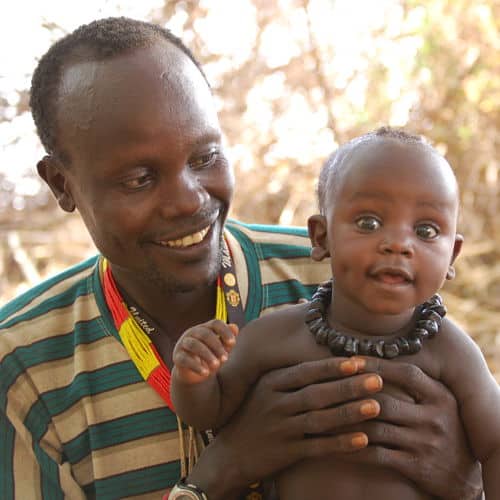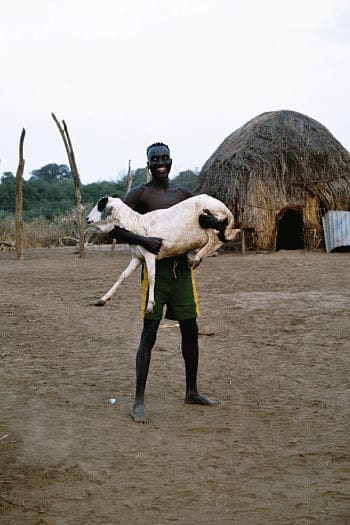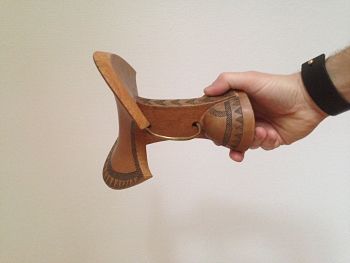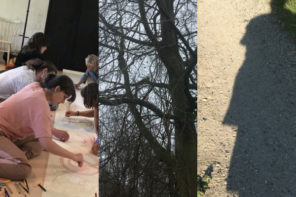The Kara of southern Ethiopia are a small population of horti-pastoralists among whom I have worked since 2003. Over the years, I collected in particularly cherished sections of my notebooks a number of taboos specific to Kara. Some were rather sensible, some were outlandish even by local sensibilities. Consider the constraints on the sheep: sheep are prohibited from scaling trees or huts. Sheep are prohibited from entering a dug-out canoe. Sheep may not enter a hut if there is merely a single woman in there. The list is not exhaustive; I am sure, with some energetic prompting I would have been able to elicit more things that sheep may not do.
When I call this “taboos”, I of course translate. These items were all explicitly declared k’aiss, a word that with its hissing pronunciation carried the sense of prohibition well – just like the German “heiß!”, a k’aiss! thrown your way, or k’aissina [it is taboo] will usually make you pause and consider. The poor sheep actually have to pay with their lives for such transgressions. At the same time, goats may do all these things, and nobody bats an eye.
Some more examples for taboos:
- One may not split open animal bones at night.
- One may not buy anything connected with fertility (seeds, female animals) with either money that was carried by a donkey, or with money that was earned by selling things carried by a donkey.
- Members of one clan may not eat liver.
- Members of another clan may not eat kidney.
- Sorcerers may not eat the heads of animals.
- A great number of taboos regulate female fertility, with a chilling strictness at times.
Taboos often tie into rituals, but as the sheep so well illustrate, even rather profane matters have invited dramatic proscriptions.
This was never a particularly serious focus of my work, and already in the field it was clear that it was best to resist the list, and simply look at the k’aiss of Kara as they came to matter in interaction. As indicated above, this rather clearly revealed that not all taboos had the same ontological status. Some seemed to be little more than quaint (and even anachronistic) objections that individual Kara might raise to get a chuckle out of an audience; others still served as uncomfortable reminders of unseen powers, broken only with strong misgivings and distinct unease. Some were expressed as explicit rules, some existed as vague tenets focusing on items, animals, practices, or something else generally considered polluting and problematic.
To illustrate the reflexivity inherent in the spectrum of k’aiss practices, a more vivid example:
My host brother Haila once prepared balls of chewing tobacco required for a specific ritual. This was about his first child and the clan, and thus had some public visibility. As he sat and formed the moist mass, a dog walked by and inadvertently stepped on the pile of already finished tobacco lumps. Dogs are not particularly wholesome animals in Kara. If not quite as polluting as donkeys, they are usually considered animated objects of questionable value at best; kaski! [dog] is a favored insult. At that very moment, I could see how Haila hesitated. What to do now? Had anybody even noticed the dog stepping on his tobacco? Was there even an explicit taboo on this? He decided to play it safe. “Oh”, he said, loud enough for everybody around to hear, which included some authoritative elders, “oh, that dog stepped on my tobacco. It’s probably spoilt now; maybe I should throw it away and start over?” Nobody took this bait. He rephrased this a little, and said it again a minute later, and again. Nobody spoke up, nobody picked up on his prompts. Nobody cared. He finished the job, and put the tobacco lumps away, for later ritual use.
Situations such as these suggested to me that at least for some taboos, the Kara considered them more or less arbitrary (if not random) prohibitions much more strongly enforced by the village community than by the spirits.
At the same time, claiming a taboo is also a mark of distinction. Only people of consequence truly have such restrictions imposed upon them – consequently, adults were subject to many more taboos than children, married men to more than unmarried men, and those ethnic subcategories within Kara that practiced fewer taboos ranked in direct correspondence lower on the local status ladder.
My position as resident anthropologist involved both shifting roles and more stable affiliations, in regard to kinship ties, integration into clans and settlements, age-organization, and more. Still, as somebody who did not really matter in the local status system, I was under very few taboos, really, and most of these were voluntarily assumed. But then, I was at that time unmarried, without children: even true Kara in my circumstances would have been similarly unconstrained. It all fit, more or less.
Now that I have a son, though, I sometimes think back to the specific set of taboos found in Kara that regulate the relation between father and eldest son.
The eldest son may not touch his father’s borkotto, the ubiquitous companion item of all men that so usefully serves as a headrest and a seat. He may not use the father’s sandals. He may not touch the father’s personalized drinking vessel. There is a certain prescription of avoidance, and while this was not strictly enforced, I did get the impression that fathers were easier interacting with their second- and later-born sons, at least once past the toddler stage. There was more physical contact, and more tenderness. The first sons were raised more strictly in comparison, ordered around, and kept at bay.
It would be easy to abstract this away as a facet of the (putatively) universal oedipal concern; and it is similarly unchallenging to point out the intrinsic problems of inevitable succession (for the head of a household), of inheritance, of the Kara age organization that pits cohorts of age-sets in a vertical hierarchy and that stipulates that an eldest son’s marriage pretty much retires his father from active political life. Some of this is of ethnological interest, some is anecdotal, some is trivial. As a fieldworker, I noted what I learned, but I never cared much.
Now I have a son myself. He very much enjoys taking my stuff. Such as my shoes. Constantly, in fact. K’aissina! He wants, at times, to sit in my chair. K’aissina! He wants to wrestle with me, which might well lead to him “victorious” and me in an undignified position on the ground. K’aissina! So what is this about? Is there a clear functional explanation for the Kara taboos on the son’s claims to daddy’s stuff? Is it a tentative struggle for power? A mimetic attempt to put himself –literally– in my shoes, once, and in future?
For me, now that I experience the urgency of a little one’s struggle with a world in which some things are his and some aren’t, it seems to be about autonomy and agency. Forbidding things in such a manner makes them doubly attractive; excluding the young boys from the village square makes the lure of the adult sphere stronger; delineating a cordon sanitaire not to be crossed under threat of k’aiss condemnation is the strongest provocation for a growing boy. The Kara know this. See, they also have the burrma ritual, which basically considers in stripping the young boys of the village of all their earthly belongings as a punishment for the youngsters’ incessant demands to be inducted into a new age-set, i.e., to be allowed to sit on the village square with their elders. But when the boys, as it happens, do not actually do so, if they do not get organized to actually heckle their elders, to demand recognition, and to publically assert themselves as agents, why, said an old Kara curmudgeon, “we just do the burrma anyway.” The experience of being jointly and ritually “robbed blind” in this manner without actual preceding provocation will bring the adolescents on their proscribed and yet oh-so necessary path after all.
Beyond the anthropological nod to reflexivity and ethnomethodological procedure, therein lies a lesson, of course, about pedagogy, about self-esteem, and about parenthood.
It is interesting that only becoming a father made me appreciate some of the lessons from Kara. Among them: Taboos can be a jolly good thing to have. It’s said that a father’s love for his son is always tempered by ambition. (Really? Always?) Fair enough; as long as it’s not pathological, I don’t see why that’s a bad thing. The Kara also want their sons to be people of consequence eventually. The eldest son (of ideally several) will bear the most responsibility for the household. Why not push them a little harder than the others The question remains, though: how taboo are these taboos?
For me, I am finding it feasible to import some Kara taboos into my lifeworld, basically, as arbitrarily imposed arenas for father and son to play in, to simulate an agon that he won’t be facing in reality for a while yet. He can probe some boundaries without repercussions, but we can both pretend. It’s probably better than a real Oedipal complex. K’aissina! Inventing taboos for fun and profit: in the header, I call the relation between Kara fathers and their first-born sons “fraught” – and it sure is supposed to appear that way. But likely, a good number of Kara sons manage to figure out the scheme soon enough. As my son already has, at 3 and change. That he still wants to play is probably the greatest lesson I can find in this whole thing.
This post was first published on 13 May 2015.












